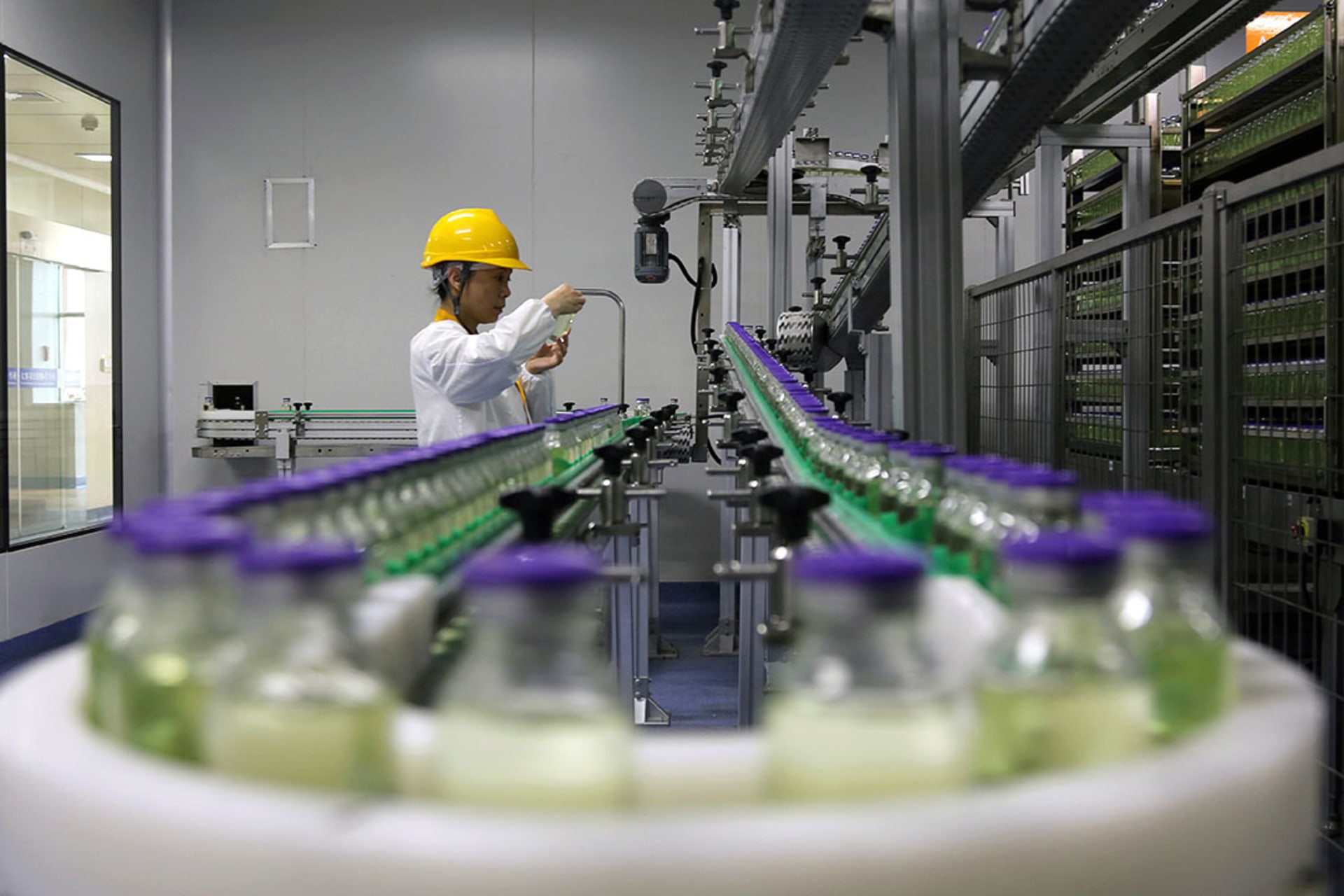Fentanyl Supply Chains in China: Chinese Fentanyl Makers and Domestic Circulation
China’s industrial policies may boost its number of small-scale chemical intermediate producers, increasing the risk that certain opportunistic firms may venture into supplying various precursors for synthetic drugs such as fentanyl.

By experts and staff
- Published
Experts
![]() By Zongyuan Zoe LiuMaurice R. Greenberg Senior Fellow for China Studies
By Zongyuan Zoe LiuMaurice R. Greenberg Senior Fellow for China Studies
The Chinese government has authorized a limited number of manufacturers to produce active pharmaceutical ingredients (APIs) and medicines involving narcotic drugs and other controlled substances (Table below).
Table 1 Legally Authorized Narcotic Drug Makers and Distributors in China

As of December 2023, Chinese authorities granted forty fentanyl production licenses to five domestic pharmaceutical companies (Table 3). These companies have been given special permission to produce fentanyl APIs, injections, and transdermal patches for medical use. There are not yet any clinically authorized oral dosage formulations in China. The use of fentanyl injections is strictly restricted to hospitals and requires special prescriptions from doctors. Hospitals are required to recycle used fentanyl transdermal patches, which still contain 3.71 percent to 75.15 percent drug residue after three days of use, due to concerns that if discarded randomly, they are likely to pollute the environment or be used by criminals to produce illicit fentanyl.
Table 2 Legally Licensed Fentanyl and Fentanyl-related Products Makers in China

Yichang Humanwell Pharmaceutical, one of the five designated manufacturers, holds an unquestionable lead in China’s controlled drug markets, controlling at least 60 percent of the market share. It also exerts absolute dominance in the fentanyl-related products market. According to a sample hospital data in 2022, the company controlled 86 percent of China’s remifentanil market share, 97.6 percent of sufentanil, and 99.96 percent of alfentanil.
Over the past two decades, Yichang Humanwell has emerged as one of the largest R&D and production centers for narcotic drugs in Asia, with five research centers in China, the United States, and Europe. Its two largest shareholders include its parent company, Huhan-based Humanwell Healthcare Group, and Sinopharm, a national pharmaceutical champion. Sinopharm has been a shareholder of Yichang Humanwell and its parent company since 2004 by purchasing 16.67 percent of Yichang Humanwell and 3.33 percent of Humanwell Group.
Yichang Humanwell primarily focuses on China’s domestic market for its fentanyl products. In 2017, the company generated fentanyl-related sales revenue exceeding RMB2 billion, of which only RMB5 million originated from exports. While Yichang Humanwell’s fentanyl-related products are exported, they are not sent to the United States, according to the company. The main destinations for these exports include Sri Lanka, Ecuador, Vietnam, the Philippines, and Turkey. The company stated that foreign buyers of its fentanyl products are all national official procurement agencies, locally authorized companies permitted to import and distribute controlled substances, and local factories licensed to produce controlled substances from the importing countries.
By law, the designated manufacturers are only permitted to sell their products to three designated national wholesalers, including Sinopharm, Shanghai Pharmaceuticals, and Chongqing Pharmaceutical. These wholesalers are responsible for distributing the products to authorized regional wholesalers, who directly supply medical institutions such as hospitals within their regions. Due to their strong position in the domestic market and the regulated distribution, these licensed manufacturers are unlikely to have a substantial export surplus, although a small amount of diversion may be possible. Furthermore, none of these five companies has obtained FDA approval through an Abbreviated New Drug Application (known as ANDA approval) for their clinical-use fentanyl products. Without ANDA approval, generic drugs cannot be legally sold in the United States. Consequently, China’s licensed domestic manufacturers are not yet able to export and sell their pharmaceutical fentanyl products in the U.S. market.
In this context, Chinese chemical companies and API manufacturers are likely the sources of what the DEA reported as China-originated fentanyl, fentanyl-related substances, and precursor chemicals that clandestine labs in Mexico have used to make illicit fentanyl products and trafficked into the United States. Chemical intermediates—raw materials to produce APIs—can be produced in chemical plants without a pharmaceutical production license. The reason is that these intermediates serve as fundamental building blocks in the pharmaceutical supply chain and are not considered drugs in themselves. Due to this distinction, chemical intermediate producers do not need to go through the same level of regulatory scrutiny and certification process as they do when making finished drug dosages. Consequently, entry barriers to their production are significantly lower, making it easier for small Chinese chemical companies to operate and supply these crucial chemical ingredients. Chemical APIs, on the other hand, are the essential raw materials for drug production and directly impact the quality and efficiency of the resulting medications. As of the end of 2022, the number of API manufacturers in China reached 1,606, whereas the number of precursors-producing chemical companies was at least 160,000 (or nearly 100 times more). Most manufacturers producing chemical intermediates and APIs in China are small private firms with flexible operations and modest investments.
Existing records of Chinese entities indicted by the U.S. Justice Department or sanctioned by the Treasury Department show that nearly all these charged and sanctioned entities are producers of chemical intermediaries and APIs. A total of twelve Chinese chemical companies—all of which are small private producers of intermediaries and APIs with an average of ten to fifty employees reported on the company website—were indicted in June and October 2023 by the Justice Department for their involvement in various aspects of fentanyl production, distribution, and sales of chemicals used in its manufacturing. These indicted and sanctioned entities are primarily in select provinces known for their large number of chemical and API firms, including Hubei, Anhui, Hebi, Henan, Fujian, and Jiangsu.
Three companies indicted by the U.S. Justice Department are in Hubei Province. The local government has included boosting the production of fentanyl APIs and fentanyl products as a priority in its Implementation Plan for Developing an API Production Base for 2021-2025, which was announced in July 2021. Developing the API industry is not merely a local policy but aligns with a broader national industrial policy. In October 2021, the National Development and Reform Commission and the Ministry of Industry and Information Technology jointly issued a Notice on the Implementation Plan to Promote the High-quality Development of the API Industry. One of the primary objectives outlined in this Notice is to improve the self-sufficiency of API supply chains and enhance the competitiveness of China’s pharmaceutical industry.
China is already the world’s top API-producing and exporting country, and its chemical industry has been the largest in the world by revenue since 2011. Guided by industrial policies, the number of small-scale intermediate producers will likely increase before the sector consolidates. Due to narrow profit margins and intensifying competition among small producers, there is a risk that certain opportunistic firms may venture into supplying various precursors for synthetic drugs, including but not limited to fentanyl and fentanyl-related substances, in addition to chemicals that have legitimate use but are nonetheless in demand for illicit uses. The flexibility and adaptability of these smaller operations also enable them to swiftly adapt their production processes to accommodate new synthetic drug formulas.
